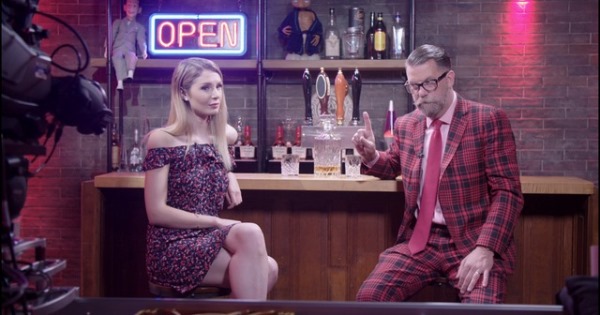
Watching White Noise, I was reminded of how Spike Lee’s BlacKkKlansman depicted KKK Grand Wizard David Duke as a deceptive new brand of white supremacist. Rather than wear the Klan hood, Duke donned a three-piece suit and a pleasant demeanor to make his racism palatable to white Americans, both over the phone and at the ballot box. White Noise, a cinema verité documentary about the alt-right’s rise to power, offers a front seat look at its marketing strategy for the digital era: racism rebranded through YouTube algorithms, podcasts, and stump speeches.
Produced by The Atlantic and directed by David Lombroso, the film follows three key movement figureheads—Richard Spencer, Mike Cernovich, and Lauren Southern—across their daily lives from late 2016 to 2019. If you’re semi-invested in politics, these names are pretty familiar. Spencer is the white nationalist responsible for 2017’s Unite the Right rally in Charlottesville, Virginia. Cernovich is the conspiracy theorist/men’s right activist (i.e. sexist troll) who hypes up conspiracy theories like Pizzagate, and Southern is an anti-feminist/Islamophobic social media star who regularly livestreams her thoughts about undocumented immigration overrunning the West. Each one operates in a different subgenre of the movement, but their underlying message is the same: whiteness (and maleness) risks becoming a minority and we’re the vanguards of resistance. Be sure to like, subscribe, and buy our lifestyle products.
Lombroso begins his story 19 days after the 2016 election, with the alt-right united under their collective victory of electing Donald Trump president. The jubilance is embodied by Spencer’s “Heil Trump” video moment, captured by Lombroso in its entirety. What also stands out is his push for a white “ethnostate,” the kind of goal Southern reciprocates on her social media platform promoting warrior/mother gender roles and mocking the threat of rape culture. Cut to Cernovich, who amusingly sees Spencer’s brand of hate speech as too on the nose. Later on, Spencer would similarly diss Cernovich as a grifter whose sexist comments are too much for his taste.
It’s only after Charlottesville—Spencer’s attempt to give his movement “political expression”—that this alt-right alliance begins to splinter. Faced with bad PR and lawsuits over the murder of Heather Heyer, Spencer is left to rebuild his brand while the other two venture in other directions. For Cernovich, this involves interacting with similar misogynistic figures like Proud Boys member (and weirdly Vice co-founder) Gavin McInnes. Where he markets toward the American crowd, Southern travels outward, visiting European political leaders, who share her anti-immigrant views, and filming an anti-immigration documentary, all while manipulating YouTube algorithms to ease new followers into accepting her xenophobic content.
There’s an uncanniness to how the film explores the down time of these controversial figures, even throwing in the occasional temporary moment of pathos when someone is confronted with the hypocrisy of their statements. Cernovich’s marriage to his wife Shauna, an Iranian American, is paradoxically non-toxic compared to his online persona (he openly admits to not being a good person). Southern’s desire to be a mother is put into conflict with her concern of raising a child in the current political environment.
At one point, she’s even hit on by McInnes via phone, with the camera capturing genuine discomfort at his unheard comments. (The Atlantic later contacted McInnes, who denies that he ever sexually propositioned Southern.) Then a few scenes later, she’s scowling at the number of Muslims in France, and you remember who we’re dealing with here.
What sticks out about these moments is the bizarre, willful detachment Spencer, Southern, and Cernovich place between themselves and their movement’s growing use of violence. Each one is perversely proud of defending whiteness, yet their fearmongering has directly inspired a rise in hate groups and terrorism, from the Tree of Life to the El Paso shootings. That they are the culprits of rhetoric encouraging actual violence has never occurred to them, or maybe it has and they don’t want to admit it, as when Spencer swears off accusations of being a Nazi from a Huffington Post reporter even after actual Nazis showed up to his big rally. Whether ironically or unwittingly, each disavowal reinforces how much these three depend on the alt-right sphere for brand relevancy.
White Noise’s vérité style might be intimate, but its drawback is how little the film connects its subjects to the larger state of the alt-right movement, which feels like it’s been usurped by QAnon in 2020. Given Spencer, Southern, and Cernovich’s dependency on controversy, it begs the question of what’s left for them if a crazier right-wing model has replaced the trio in the fringe-to-mainstream discussion. They’ll still be promoters of white supremacy, but as digital influencers, they’ll be something far worse: internet has-beens.






Leave A Comment